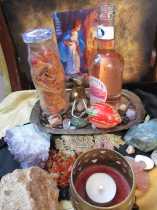The deer was lying in the middle of the road. There was no way he was going to avoid hitting it.
My friend and a buddy were on long haul to a heathen gathering. Flying down the Interstate in the early October dusk, they'd been driving all day; his companion was asleep in the passenger seat. In retrospect, my friend thinks that he'd been on the verge of drifting off himself, when suddenly the deer—as it were—materialized right in front of him.
My friend swerves to avoid it, but it's too late. With an explosive boom, the driver's side wheel ricochets off the deer, and the truck actually rears up on its two side tires. A rollover seems inevitable.
Somehow, my friend manages to wrestle the truck, now careening for the ditch, back down onto all fours. He hauls hard on the wheel, spraying gravel. When he finally regains control, he pulls over and stops, and—his friend now rudely awake—the two of them sit there a long while just breathing, badly shaken.
“I've got to go move that carcass,” my friend says, finally. You don't go leaving dead deer laying in the middle of the road for someone else to hit.
My friend gets out. He checks the front of the vehicle. Oddly, the impact doesn't seem to have done any damage. He checks underneath, where he'd heard the buck's body bouncing; no damage there, either. Looking skyward, eyes closed against the sudden gentle rain, he murmurs a prayer of thanks and kisses the truck full on the hood. Then he goes around back to get a tool to help move the body.
They're on their way to a heathen gathering. The only tool they have with them that could possibly be of any use is a reproduction Viking Age ax.
My friend takes the ax and starts walking. On the way he thinks: A big guy with a big beard in a leather biker jacket, walking down the side of the road, hefting an ax. This is gonna look really good.
He walks for maybe a quarter of a mile before he gets to the deer: once a 300-pound lord of the prairie, now a mess of tangled legs and blood. With the help of the ax, he manages to drag it off of the road.
Saying a few words to send the deer on its way, he spots a broken antler laying in a pool of blood. He picks it up and pockets it.
He walks back to the truck and gets in. That's when the state trooper pulls up.
He leans into the open window. “We had a report of a big guy walking along the side of the road with an ax,” he says.
“That would be me,” my friend tells him. “I hit a deer about a quarter mile back, and didn't want to leave it in the middle of the road.”
“Oh,” says the cop. “Did you boys want the meat?”
No, they didn't. They drive off, and eventually arrive safely at the gathering.
Unpacking, they find that one of the two bottles of killer home-brewed mead that they've brought with them has broken.
His buddy chafes at the loss, but my friend is content.
“When we reared up on two tires, I prayed: Get me out of this, and I'll pour you out a bottle of mead,” he said.
The truck could have been totaled. They could both have been injured, or killed. Instead, the only casualties were a deer, and a bottle of mead.
My friend finishes his story. We both take a sip of beer.

















